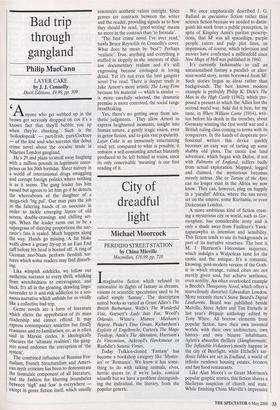Bad trip through gangland
Philip MacCann
Anyone who get webbed up in the brown get seriously dropped on cos it's a known fact that they'll bubble you up when they're chucking.' Such is the `hollockspeak' — part-Irish, part-Cockney — of the lost soul who narrates this debut crime novel about the cocaine trade in Nineties London gangland. He's 29 and plans to stroll away laughing with a million pounds in legitimate enter- prises on his 30th birthday. Sheer naivety in a world of international drugs smuggling and corrupt foreign politics where nothing is as it seems. The gang leader has him sussed but agrees to let him go if he detects the whereabouts of the daughter of a mega-rich 'big pal'. Our man puts the job in the faltering hands of an associate in order to tackle emerging layers of old scores, double-crossings and chilling set- ups. When the leader turns out to be a supergrass of dizzying proportions the nar- rator's fate is sealed. Much happens along the way. Hands go missing. A fat bloke wolfs down a greasy fry-up in an East End caff before his head is booted off. A ring of German neo-Nazis perform fiendish tor- tures which some readers may find disturb- ing. Like wimpish sidekicks, we follow our authentic narrator to every thrill, whisking from wretchedness to extravagance, and back. It's all in the gloating, drawling lingo: surrender to it and risk addiction to a sen- suous narrative which unfolds for us vividly like a collective bad trip. Genre novels are a form of literature which elicits the approbation of its mass readership and cannot offend. It may express contemporary anxieties but finally reassures and re-familiarises; or, as is often said in Marxist circles, it ideologically obscures the 'ultimate realities': the gang- ster novel endorses the corruption of 'the system'.
The combined influence of Russian For- malism, French Structuralism and Ameri- can myth criticism has been to demonstrate the formulaic component of all literature, and the fashion for blurring boundaries between 'high' and 'low' is everywhere except in genre fiction itself, which usually renounces aesthetic values outright. Since genres are contracts between the writer and the reader, providing signals as to how they should be read, 'good writing' means no more in the contract than `to formula'.
`The best crime novel I've ever read,' bawls Bruce Reynolds on Connolly's cover. What does he mean by 'best'? Perhaps `realistic'. True, anything and everything is stuffed in sloppily in the interests of shal- low documentary realism and it's still engrossing because envisaged in loving detail. Yet it's not even the best gangster novel I've read. There is deeper truth in Jake Arnott's more artistic The Long Firm because his material — which is similar is more carefully selected, the dramatic premise is more contrived, the social range breathtaking.
Yes, there's no getting away from aes- thetic judgments. They allow Arnott to express heightened moments, insight into human nature, a gently tragic vision, even in genre fiction, and to gain vast popularity. Layer Cake is an immensely entertaining read; yet, compared to what is possible, it remains a self-consuming artefact blatantly produced to be left behind in trains, since its only conceivable 'meaning' is our first reading of it.


































































 Previous page
Previous page